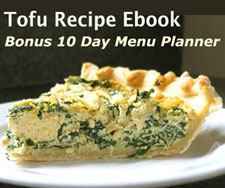
Holiday Party Planning Stress Tips
Vegetarian Menus: Veg & Non-Veg Eat Together For The Holidays
Adapted from the free Savvy Veg Report Vegetarian and Non-Veg Together, A Guide to Harmonious Co-Existence.
At holiday time, people are often stressed about feeding veg or non-veg friends, relatives, and total strangers.
Why should this situation continue, when it can be solved by good will & common sense, plus a few ground rules and menu suggestions?
12 Stress-Free Holiday Tips For Feeding Veg or Non-Veg Guests
1. Regarding what vegetarians and vegans eat, and whether they should in fact be veg, and whether meat-eating is unhealthy, unethical & ruining the planet:
My advice is don't even go there! Take the opportunity to stretch your boundaries, and cultivate loving tolerance & generosity.
2. Don't isolate your special holiday guest. Integrate veg friendly and non-veg menu options, and make sure that at least half the dishes you serve can be enjoyed by all.
3. Ask your guests in advance about their likes and dislikes, and whether they have allergies or food sensitivities. Solicit their help in planning the menu.
4. Offer your guests the option of bringing a dish to share. That way all your guests can be sure of having something they'll enjoy eating. But get them to bring foods that everyone can eat - be menu specific, and use your host veto as needed.
5. Describe any vegan (dairy and egg free) dishes as non-dairy or no egg, or low fat, low cholesterol. This will endear you to dieting and health conscious guests, plus sidestep all the vegetarian/vegan issues.
6. For vegetarians: If possible and appropriate, serve turkey or ham to your decidedly non-vegetarian guests, or have them bring some. Often people don't feel well fed unless they can eat what they are used to eating. And you do want your guests to feel well fed, right?
7. Stick with familiar comfort foods. That includes dishes with egg or cheese, like quiche or lasagna. Chickpeas and kidney beans are fairly safe, and can go in salads or soups. Ethnic foods work well - if it's spicy and tasty, people are less likely to notice there's no meat, especially if there's cheese or egg involved. The dense, chewy, brown qualities of whole grains confirm non-veg suspicions about vegetarian food, and tofu is too strange for most people.
8. Rich desserts like cheesecake are popular and filling, and you can find or make vegan versions. Fruit pie or crumble can be made with veggie spreads such as Earth Balance, or you can buy vegan piecrusts.
9. For non-vegetarians feeding vegetarians or vegans: Unless you know otherwise, assume that your guest is vegan, and eats no animal products whatsoever. Animal products include: all varieties of meat, fowl and fish, meat by products, eggs, dairy and honey. Vegetarian protein sources include beans, lentils, nuts, seeds, sometimes cheese or eggs for non-vegans.
10. When feeding vegetarians or vegans, please don't co-mingle animal foods with non-animal foods, and expect the vegetarian to pick out the meat, or eat around it. The taste and sight of the meat will remain to offend vegetarians, or make them sick. Watch out for these hidden hazards:
- 'Vegetable' soups or other dishes made with beef or chicken broth
- Stir fry with bits of meat, chicken or fish
- Bacon bits in the green beans
- Egg in the mayonnaise
- Gelatin in the jello
- Hard boiled egg or feta cheese in the salad
- Sauces and dressings with dairy, egg or honey
- Cooking with butter or other animal fats
- Sweetening with honey
11. Be sure to include a grain dish (rice or pasta) or two, bread, veggies and/or salad, with no animal ingredients. Serve meat, eggs or cheese on the side, or make veggie versions.
12. There are always situations that nobody could predict, and can't imagine how to deal with. That's when you fall back on your sense of humor. And pray that everybody else has one too!
Check out our holiday recipes for tasty dishes that veg and non-veg both will enjoy. Browse through our recommended cookbooks for ideas. Two excellent holiday helpers are Vegan For The Holidays by Zel Allen, and Vegan Holiday Kitchen by Nava Atlas. For non-dairy substitutions and ideas, read Vegan Baking Substitutions.
Happy Holidays! - Judith Kingsbury






